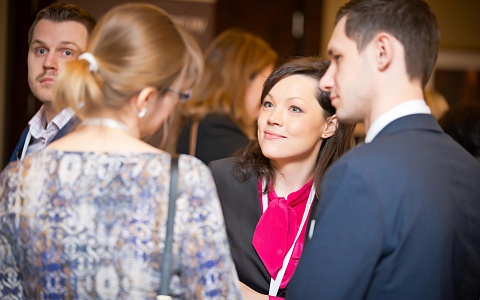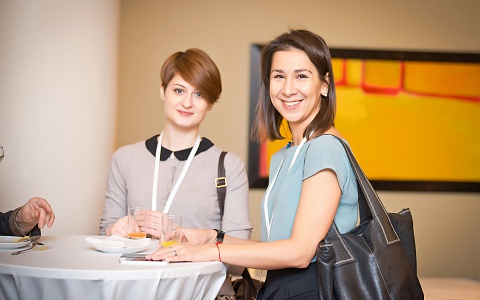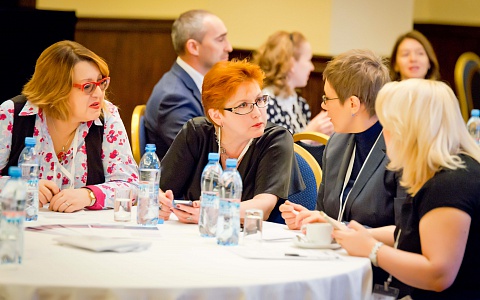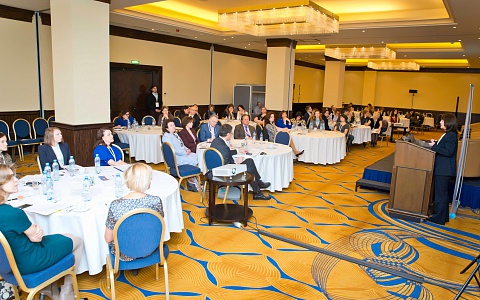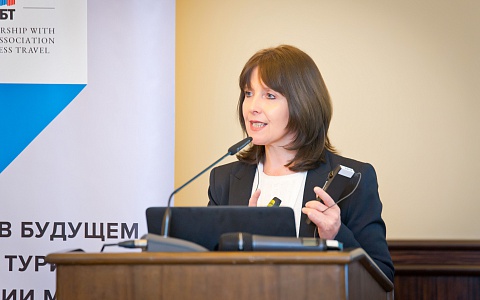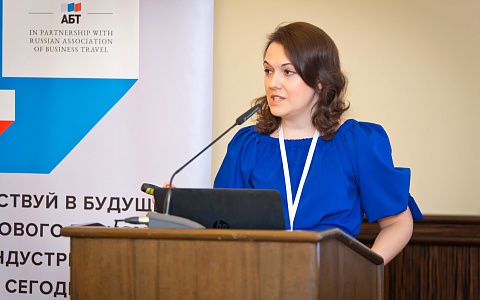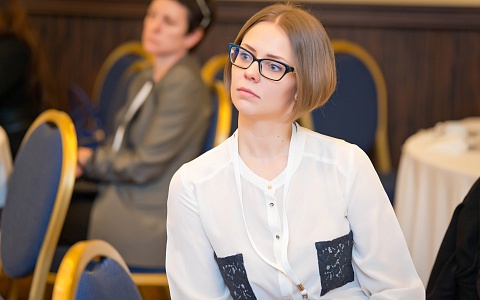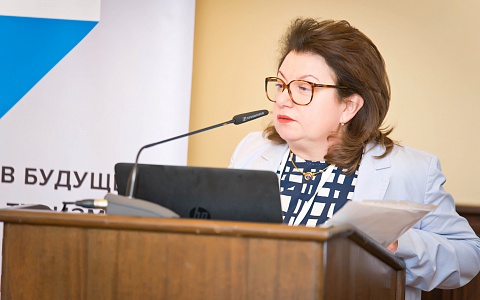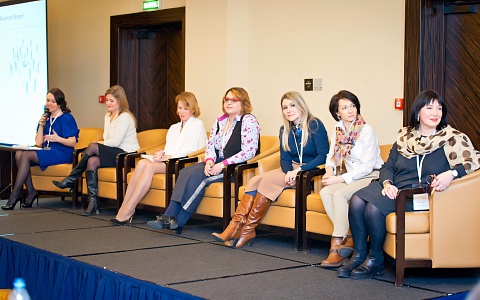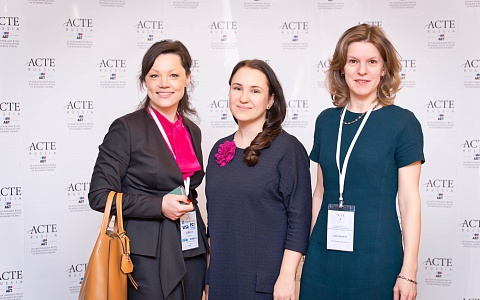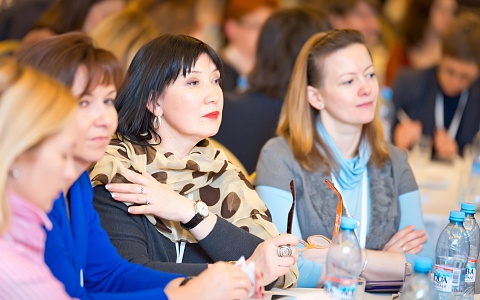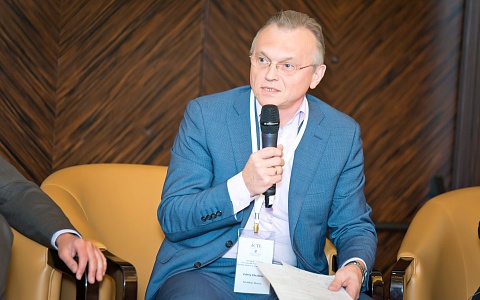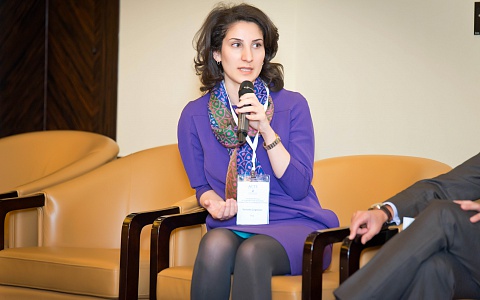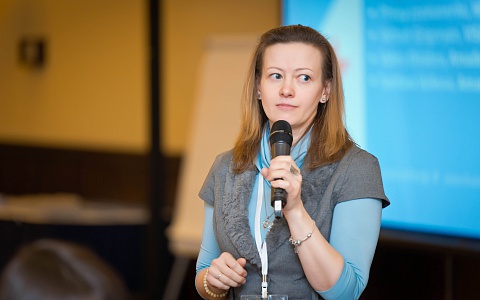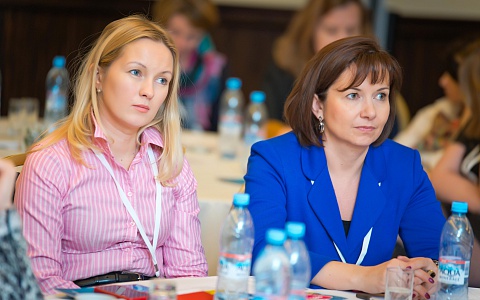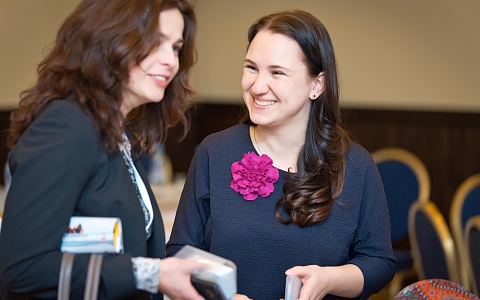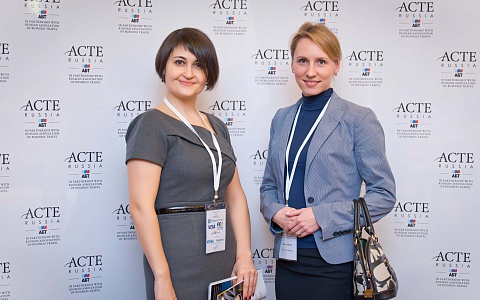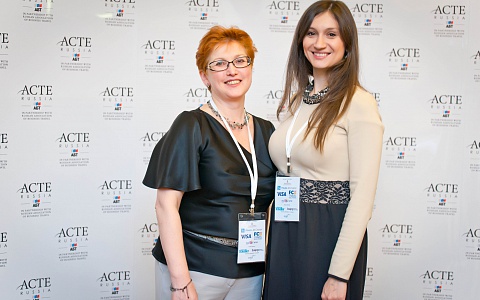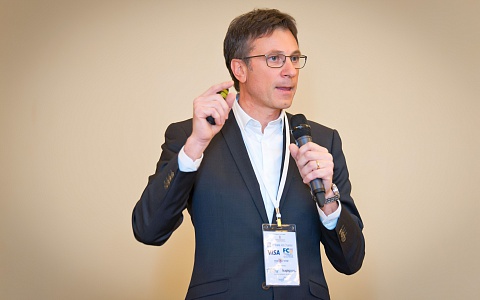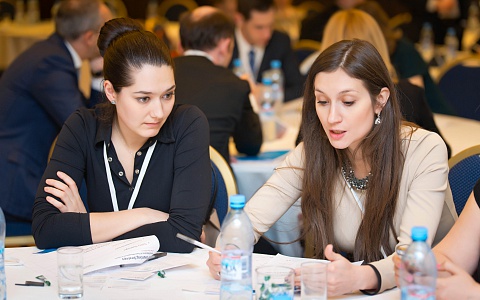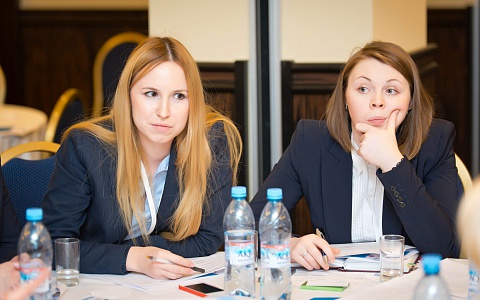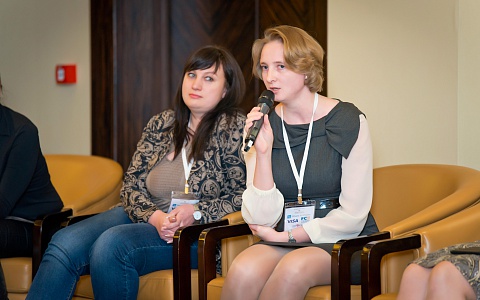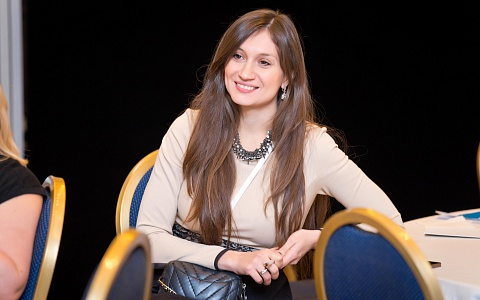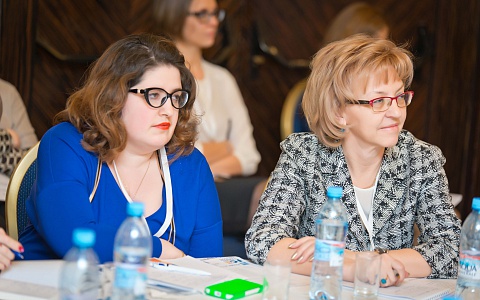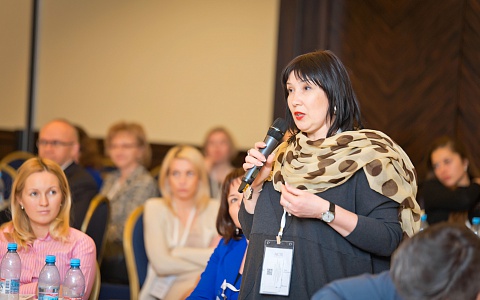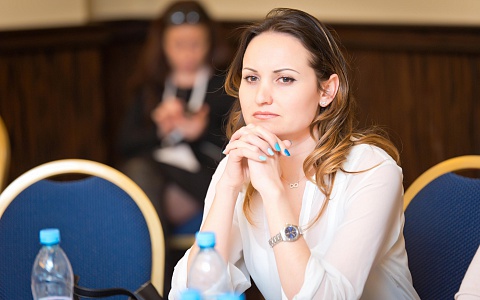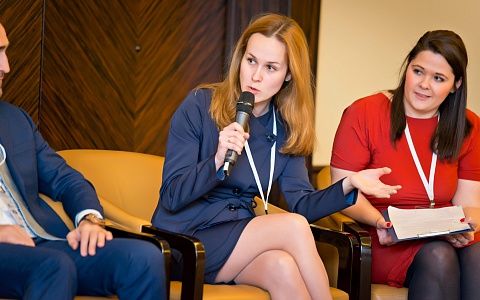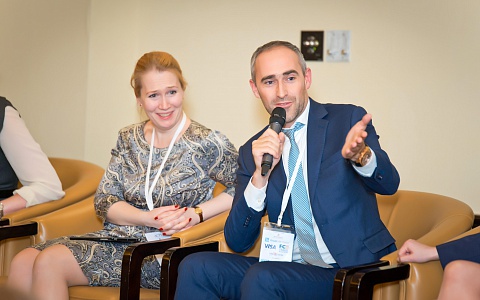ACTE Forum: to be ahead of the game you should discuss topics of the future
«Nowadays the Russian business travel market today is rich in all kinds of events. And you should agree that it all often comes to a mere exchange of opinions. ACTE Forum is a completely different thing. Look, I have even put down about seven issues I am going to discuss with my colleagues, HR department and directors of the company», Inna Alshevskaya, administrative director of Media Saturn Russia shared her impressions of the Forum of the Association Corporate Travel Executives (ACTE). This year Russian business travel experts gathered in Moscow Renaissance Monarch Centre and the main topic of the educational session was «Business travel in the changing geopolitical and economic environment».
Svetlana Denikina, BBT Russia editor, set the tone of the meeting and presented her report «What does it all mean? Or a very brief review of the Russian business travel industry»: «Of course, I can not help paying attention to the economic situation in our country today. Organizers asked me not to use the term «crisis», so let us call what is going on «the changing reality».
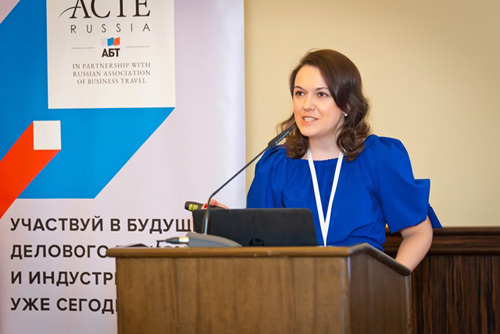
The expert cited figures from ABT-ACTE Russia Yearbook-2015 — an annual global report on the state of the Russian business travel market. This year BBT Russia participated in report preparation. «It is a large-scale research of about 150 pages. Here all the segments of the Russian business travel market are studied», Ms Denikina explained. «It is unique, because for the first time figures taken from reliable open sources have been proved by the results of the questionnaire that included opinions of almost 300 travel managers from more than 250 Russian and foreign corporations» .
No doubt, the travel industry has been affected by the geopolitical situation in the country that resulted from annexation of Crimea. Businesses of many market participants have been affected by sanctions, rouble devaluation and a drop in energy prices. «In June 2014 Brent cost was at its maximum of $114, and in January 2015 — at its yearly minimum — $48,5», the expert reminded.
In December 2014, for the first time since autumn 2008, annual inflation amounted to a two-digit figure — about 12%, and in 2015 according to the Central Bank forecasts, it may reach its maximum in the second quarter and amount to 16-17%. «We did not experience anything of the kind even during the 2008 crisis», Ms Denikina added.

Russian GDP in 2014 was at its lowest value for four years and slowed down to zero, according to the Ministry of Economic Development and Trade. If oil prices stay at the level of $60 a barrel, Russian GDP in 2015 may drop by 3% right away.
Nevertheless, 2014 in general was positive for the Russian travel industry due to the results of previous years. According to the Association of Business Travel, the market volume amounted to 560 billion roubles, and it was an almost 18% growth to the previous year. «We will not have such figures in 2015», the speaker regretted.
Then the results of Yearbook-2015 poll of Russian travel managers were presented to Forum participants. Almost half of the companies said the number of business trips grew last year, and in 40% of companies it remained the same. On average, about a quarter of corporate buyers (26%) spent more than 30 million roubles a year on their employees` business trips. About the same number of companies said this figure exceeded 20 million. And more than a half of respondents who participated in the poll last summer said they did not plan to change their travel policy. «Remember these figures, because later we will see how much they were adjusted this April already», Ms Denikina drew attention of the delegates.

As for business destinations, the majority of events are held in Russia and the CIS. More than a half of respondents said they travelled on business within their country. As for MICE, these figures are even higher and amount to almost 70%.
«In summer we asked our respondents what their forecast for 2015 was. But again, we were in some other reality at that time», chief editor of BBT Russia continued. «So we held another anonymous poll almost a week before ACTE Forum».
Judging by the answers, the situation has changed dramatically. Almost 60% of respondents answered the question «Do you plan to toughen your travel policy because of the new economic conditions?» positively, saying they would make serious adjustments, decrease accommodation limits and control compliance better. Let us remind you, that nobody was going to do it in summer. Travel policy priorities were adjusted as well. In the conditions of severe economy that is the goal of many companies at the moment, 67% of respondents, and not 15%, as in summer, count on special rates. And no one spoke about introducing technologies half a year ago. Now technological solutions got 40% of votes, and we are speaking about Self Booking Tools (SBT) in the first place. Russian companies hope their introduction will let them decrease travel costs due to the reduction of agent fees.
Respondents mentioned the necessity of introducing corporate cards and other payment solutions (21%) for the first time. «But we should note that the last BBT Russia round table showed that the level of awareness of such solutions was extremely low yet. And providers still have a lot of hard work in this area», Ms Denikina said.
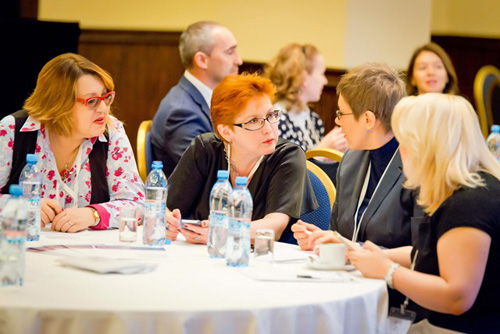
How are buyers going to cut travel costs? In the first place by reducing the number of business trips and events: 76% of respondents said they would have fewer business meetings in 2015, and of course MICE. Interestingly, no one was going to cut these cost items last summer. 52% also said they would replace part of business contacts by video conferences and other remote communication technologies, 48% of companies would set limits for air travel/accommodation, 36% hoped to optimize budgets by introducing online booking technologies, 15% would lay off staff and 9% — hold a tender to change their main provider (ТМС).
The poll has also shown that MICE will experience the greatest reduction — more than business travel. Thus, 51% of respondents plan to cut the number of events by 20%, and 16% of companies said they would cut the number of events by 50-80% altogether. And if in 2014 about 60% of events were held on the territory of the CIS, in 2015 the shift in this direction will be even more evident.
«So, what does it all mean?» Svetlana summed up. «Crisis is the time of opportunities. Despite all these negative figures that have been demonstrated today, we should abandon stereotypes as much as possible and be open to innovations, introduce technologies more actively and not be afraid of discussing topics of the future, even not of tomorrow. Only then we will be ahead of the game».
One of such futuristic topics is open booking technology, the discussion of which was initiated by Ms Denikina: «Is managed travel really done for? Nowadays Internet offers us an impossible number of options, so some employees may be perplexed why they are recommended to use only certain corporate booking channels — be it SBT or a travel agent».
Panel discussion was started by Olga Belyusenko, executive director of FCm Travel Solutions Russia. She explained what the new technology meant: «Open booking is a strategy of corporate travel management that allows all the employees to make bookings through all possible channels, including direct websites of air carriers, hotels, websites like booking.com, etc. But the main thing is that all the booking data should be included into the corporate database, which is very important for fulfillment of duty of care and work with providers. This is its difference from non-managed travel».
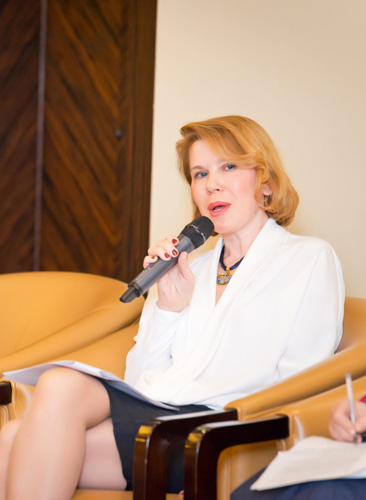
Where does it all come from? Everything new is caused by discontent with what you have. Ms Belyusenko cited interesting data: in 2014 PwC asked 976 travellers from all the regions whether they were satisfied with travel policy. Only 25% of respondents said they were completely satisfied. The others split in the following way: 44% were more or less satisfied, 19% were absolutely neutral, 9% were negative and 3% — very negative. When business travellers were asked about the reasons they were not satisfied with their travel policy, their answers were as follows: you can find lower rates in the Internet (56%), a very limited list of preferred providers (35%), a long booking process through the corporate channel (30%). Besides, you can not book extra services through SBT: choose a seat, fast track services, personal preferences are not taken into account, you can not book from your favourite device, and others.
Not many technological providers enable data collection in case of open booking. «One of them is Concur», Marina Krechetnikova, JTI administrative director took the floor. «The provider offers the tool that lets you get statistics and work with data. Moreover, to understand where the employee is at the moment and help him. And you have all this for your corporate rate. This mechanism also leads to considerable economy, because you will definitely find lower rates in the Internet: there are lots of channels nowadays, and the company uses only a limited number of them».
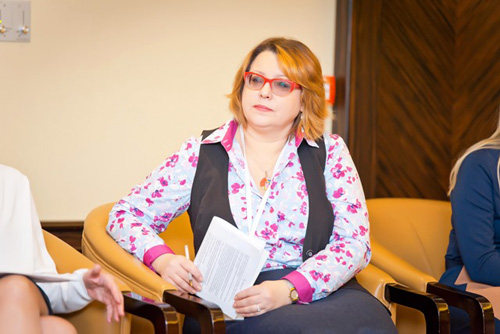
But the expert stressed that Concur was only starting to promote this product, and moreover, the company had not entered the Russian market at the moment. And it means that open booking will hardly displace travel agencies in the near future: «That is, we are speaking about the day after tomorrow», Marina assured TMCs. «And it gives travel agencies the chance to grow and flourish. But, colleagues, we should be ready for the moment when open booking technologies appear in our life: there are more and more technically heeled experts».
On her part, Mila Sidorina, Marketing Director of Carlson Wagonlit Travel Russia asked colleagues to be more realistic about the situation: «Yes, we can not ignore interests of our internal customers, sooner or later well-being of our company will start depending on their satisfaction. And it does not really matter, whether they belong to generation X or Y. But it is very important for all of us, including providers and TMCs, to observe interests of the parties. Why does the traveller prefer Internet? Because if we consider all the stages of a trip — from business trip arrangement to return — the only traveller’s concern is quick and easy booking. He does not think strategically, does not care what will happen later. And our common task now is to bring up loyalty in our internal customers, and understanding of the advantages of the travel policy.
The expert’s idea was continued by Vera Chelenk, Administrative and Purchase Director of BNP Paribas: employees will not need open booking if they are satisfied with their corporate program. «For example, our employees do not show willingness to book business trips themselves», Ms Chelenk said. «They like being paid attention to — both by the travel company, and administrative staff, and assistants».
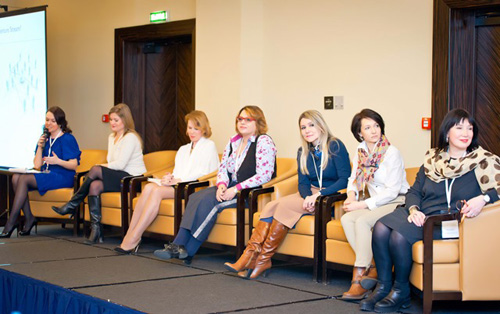
Besides, the traveller should understand that his company has always offered him a reliable provider with impeccable reputation and good service, the speaker added. And the «Law on personal data» implies certain responsibilities for the company. It is not clear how all these issues are solved in case of open booking.
«Moreover, if we take into account that online tools are not widely used in Russian companies and colleagues still do not use them for some reasons, open booking that has not appeared in the Russian market yet, is indeed questionable», Elena Lutsenko, procurement manager of Saint-Gobain Rus took the floor. «How will reports and closing documents be prepared? And this is a big headache for any company, because it is important to take travel costs that are financed with corporate funds, to the right account».
Valeria Zakharova, sales manager of Travelport, noted that distribution systems also tried to provide their users with personalized data: «We have compiled all extra services offered by providers. That is, if you make a booking through GDS, the agent may choose options he needs. Wi-Fi or lunch on board, for example. As for hotels, in order to assist travel agents, Travelport offers TripAdvisor ratings of top 5 hotels».
At the end of the discussion Ms Sidorina agreed that those were flush times for TMCs: «All our customers are focused at the travel policy. And many of them are really anxious about how to make it really work and employees follow it. Of course, you can force them. But sooner or later the stage of fine work will come, when you have to help the traveller arrive at what the company expects from him. And TMCs can help us do that. It goes about increasing our level of culture, colleagues. Our employees are not yet ready to make steps together with us that will let everyone benefit».
Olga Khorasanova, Head of EMEA Business Travel in Accenture spoke about technologies that could be used to increase employees` loyalty to the travel policy. In her words, for the past 4-5 years extra solid managed travel has been built in the company with approximately 280 thousand employees all over the world. That is, it works with one travel agency and one card provider. In order not to make Accenture employees feel they are imposed some rules, it was decided to introduce some game elements into business travel.
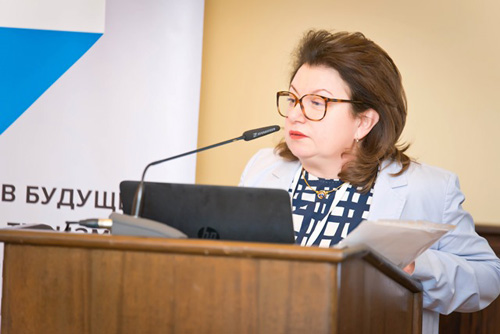
«It is called gamification», Olga said. «Thus, we have introduced something similar to Facebook inside our company — Smart Traveller. It belongs to world’s top 5 streams used inside companies. And we have about 3,5 thousand users — it is a big step forward. It is live communication, a blog. All the company employees can use it. It is an example of staff involvement into discussion of important travel issues».
Moderator of panel discussion Svetlana Denikina thanked all the participants for their valuable comments and lively discussion and stressed once again the main focus of the Russian travel market: «This is a new age for TMCs, and it means their technologies should change. It will allow corporate buyers to retain balance between their interests that always consist in budget optimization, and interests of their employees, that expect a personalized approach».
The problem of bulk data collection and assessment that is more urgent for the industry, was the key topic of the next session. Caroline Allen, regional ACTE director EMEA explained that big data meant very large volumes of data collected on a casual basis. «This is a bulk of unstructured information that opens vast opportunities. And it does not matter whether you sell or purchase it. The main thing is to use this data in the right way». Research conducted by McKinsey consulting company has shown that the world badly lacks experts able to analyze big data. Their number is a little above one million. And comments of experts, who were invited to discuss the topic, showed that there was no agreement on the definition of big data in the Russian market at all.
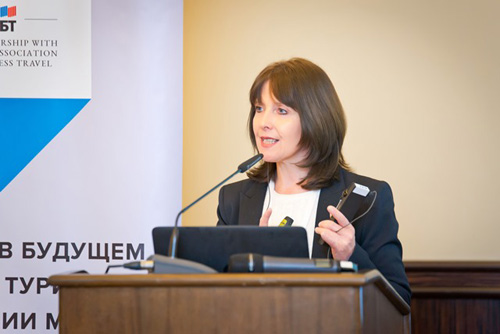
«It is like an iceberg», Valery Khrabrov, general director of Amadeus Russia gave his understanding of big data. «And reports are only 0,001% of what they represent. In general, the idea of big data is to make a behavioral model of a certain segment, class of users».
Anatoly Kuryumov, General Director of IBC Corporate Travel, tried to explain the participants what big data was by the example of his company: «Suppose, a customer books business trips. At a certain moment we see from statistics that he usually flies with S7, in the mornings and very frequently. And we also know that if he travelled on Thursday, he could save 10% on this flight. We do not offer anything, but just give the customer an opportunity to save by providing this data. It means that big data is the analysis of all customer requests. And any customer can ask me whether he is in the market price, when he is offered a certain hotel rate».
Philip Lookianenko, General Director of HRG Russia also noted inefficient use of data by companies: «Suppose, you get the necessary travel data, but the problem of its analysis arises right away, and it is not always solved by efforts of an account manager. I also think, and many will probably agree with me, no one is ready to pay for data at the local level. All this reminds me of the situation with breakfast at a hotel: it just has to be included».
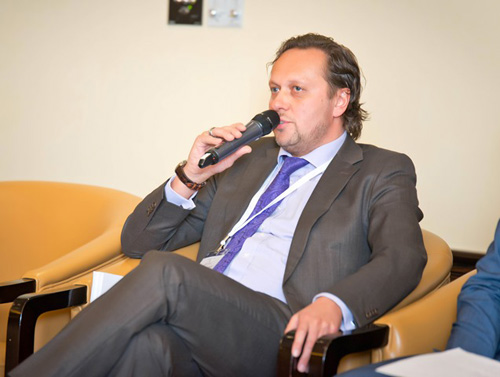
But judging by what Olga Gadjieva, travel manager at PwC said, there are some examples of efficient data use, however. The expert said that about a year ago their TMC made a report on all the directions for their company: where employees go, what hotels they stay at, their cost. «We were given 12 recommendations on travel policy improvement and travel cost optimization based on this report. As the result the operational committee approved three items. More restrictions on business class flights were introduced, new city limits appeared and shares of airlines were corrected. Interestingly, our professional auditors and consultants who read the report estimated the data as „a highly professional analysis“. And one more thing: apart from recommendations, the agency calculated our prospective economy that amounted to millions. We achieved a million only with these three items».
Vartush Grigoryan, VISA Product Development Manager in Russia added that in order to get an ideal picture of data collection and analysis, participation of all the parties interested is necessary: «After the traveller returns from a business trip, there is the problem of accounting. Travel managers do not deal with it directly, but it is a nightmare for accountants. Anyone who has ever filled in an advance report knows it. Besides, reports filled in manually still exist. Although companies all over the world have long been making their way to automation that is achieved largely due to the use of corporate credit cards». Ms Sidorina specified another trend in data use: «Russian realities make us work with data not post factum, but on the real-time basis. Only in this case you can react to this or that situation quickly and actively. This is the smart solution you should be out for».
After lunch the Forum continued in the form of an active workshop. Corrado Simontacchi, Board member of Belgian Association of Travel Managers (BATM) asked the participants to split into two groups — corporate buyers and providers, to show in practical work what the art of talks meant. «The world is not changing», the expert said. «It has already changed. And the reason is not the crisis. The reason is us, we have become different. I have a question for you in this respect — has your talks strategy changed?»
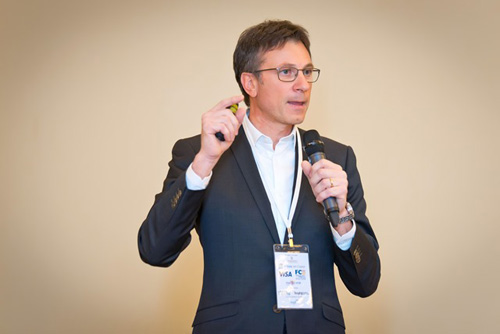
According to the speaker, today any travel program should include five main components: trip safety issues, restriction of travel costs, integration of booking and travel management and correspondence of travel program goals to the strategy of the company. In order to fulfill all this you need well-trained staff that will be able to choose providers and control them, pay due attention to such issues as contract type, its term, how frequently the company will have to enter the market, ability to take decisions. Because the goal of talks with a provider is the achievement of the best agreement that includes different variants.
In order to achieve the maximum effect you should focus not only at prices, but also at the total cost of ownership (TCO). «Anyone can get a lower price, but the aim of the company is to achieve the lowest TCO», Simontacchi stressed.
Then each of the groups was offered a case study. After «obstacles and limitations» were analyzed, they had to make a draft plan of talks with a provider (methodology, key arguments and levers to achieve the best result).
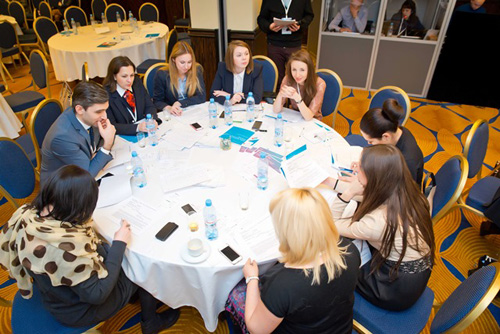
«Russian MICE in detail» was the topic of the last panel discussion of ACTE Forum. Anatoly Kuryumov, General Director of IBC Corporate Travel spoke about what was going on in this market segment at the moment. In his words, not all the companies are going to cut MICE budgets: everything depends on their portfolio balance. But they had to start looking for new customers anyway: «When investors told me they did not have any more borrowed funds, I started talks with China. It turned out that as the result of the dollar rate rise they were willing to send entire tourist groups to Russia. And at the moment we have concluded agreements for transportation of 60 thousand people. Just imagine how much it is! It is only because TMС facilities make it possible to take on DMC tasks».
Another trend in Russian MICE market is the variety of meeting forms. Mr Kuryumov said customers ordered quests, master-classes, business lunches, creative presentations, events in business schools more and more often. New formats include an exchange floor (a special event where sellers meet buyers like at an ordinary stock exchange) and even an anticonference.
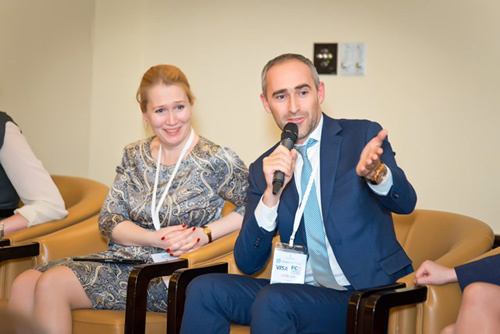
«The number of events is growing, but their budgets and the number of participants are smaller. Why? Because they are more personalized and targeted», Anatoly explains.
If we speak about event geography, it has become wider in fact, rather than in word. Regional investment policy has proved efficient. «Now our customers hold events throughout Russia, including Crimea», the expert stressed this trend in MICE market.
More requirements to event arrangement have appeared. Companies ask the agency to determine the target audience, invite it, arrange the event and estimate its ROI. That is, customers in Moscow tend to outsource marketing functions to the agency.
«My dream is to create an automatic procurement system», Anatoly admitted. «When a customer comes to me and asks how much a sandwich costs in Kaluga, I want to know what to answer him. And we do not have such a tool in our country. But some customers do have it».
The expert ended his speech with a quotation from Mikhail Bulgakhov`s novel «The Heart of a Dog»: «Hence, the rack and ruin are not in the bathrooms, but in the heads» — if our agencies and customers are able to be flexible, react to all the changes on a real-time basis, since we have entered the online era, our business will grow«.
Natalia Zakharova, head of MICE FCm Travel Solutions, noted great popularity of Russian event destinations: «Earlier our customers considered Russia a trade-off decision for limited budgets. And now it is a comprehensive destination where you can arrange a high quality event. And to my mind, this is the main trend of the industry. More and more good venues appear in Russia — Oryol, Sochi, Kazan — that meet companies` highest standards. And we are speaking not only about small events. It means facilities are being adjusted to market requirements. The demand is not forced, it is responsive».
Tatiana Lenshina, Head of corporate event group of ZCTS agreed with her colleague. The expert noted that if a trip had an incentive component, several years ago you had to look for foreign destinations. And now customers are ready to consider options within this country. Tatiana also noted strict budget limits: «Usually the customer announces a certain sum. Last year in the same conditions we could suppose that if it was a million, we could count on one — one and a half million. We by no means aim to earn anything more from our dear customers, but it has always meant that the agency is offered a reduced budget, because the customer understands he may have extra expenses. Now customers have taken a tougher stance. And we know — if it is a million, we must meet this budget.
Mila Sidorina from Carlson Wagonlit Travel also paid attention to the difficult financial situation. In her opinion, the main problem that needs being discussed and solved, and it refers to all the travel agencies, is the inability to extend credits to customers: «I am sure that many TMCs feel uncomfortable in this situation. And I do not understand why we keep silent about it. Nowadays TMCs can not borrow from banks. Rates have grown from 12% to 25% or even 30%». Mr Kuryumov agreed and suggested his colleagues took a common stand in this issue.
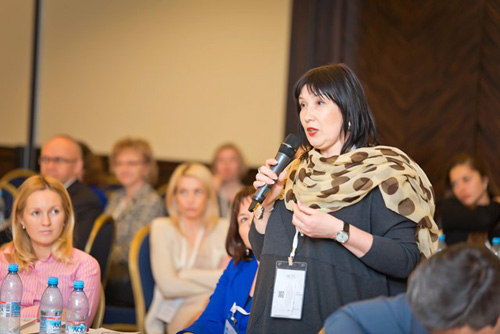
All the participants could continue their discussion during the standing reception. Forum participants did not leave for a long time — there were so many things to discuss! «I have attended this Forum since ACTE came to Russia, and it is the liveliest discussion I have ever been to», Maria Sergeeva, Head of business travel department of Otkritie Holding expressed her delight. «It is great and interesting! And if that it seemed to me before, that we should discuss only urgent issues, now I am persuaded we should go beyond the boundaries of daily agenda and analyze what may happen tomorrow or even the day after tomorrow. And it is great that organizers have started using Russian, because not everyone, even if he speaks English, will speak it in front of the audience». «It is very important to hear opinions of our colleagues` who have long been working in the market, especially in the current complicated situation in our country and in the travel industry in particular », Vadim Gubzhev, head of corporate department of Turkish Airlines said. «It is important to know that everyone is following the same route without slowing down. Here all the market participants have been represented — large agencies, service providers, corporate buyers. And all of them have an opportunity to express their opinion, which is very valuable».
«I may have lacked a more detailed discussion of the questions of tightening travel legislation», Irina Karnaukhova, Development Director of Demlink Travel expressed her opinion. «Everything that is connected to taxes, the situation in DMCs, compensational funds that will be created because of the clear-out of several tour operators. But in general I consider the event very useful and interesting».
Anatoly Kuryumov, general director of IBC Corporate Travel was also very satisfied with the Forum: «To my mind, awareness of the audience of what we are discussing is higher and higher. And it means we are growing as professionals. The second important factor for me is the right choice of topics for discussion. The audience should be involved into it. I took part in an event several days ago where 20 HR directors of the leading companies of our region spoke about the importance of staff involvement into all the business processes, because requirements to it are higher than usual. The same situation is about us: customers require almost the impossible from us. And at the moment ACTE Forum demonstrates great involvement into urgent problems of Russian audience».
Marina Osipova
